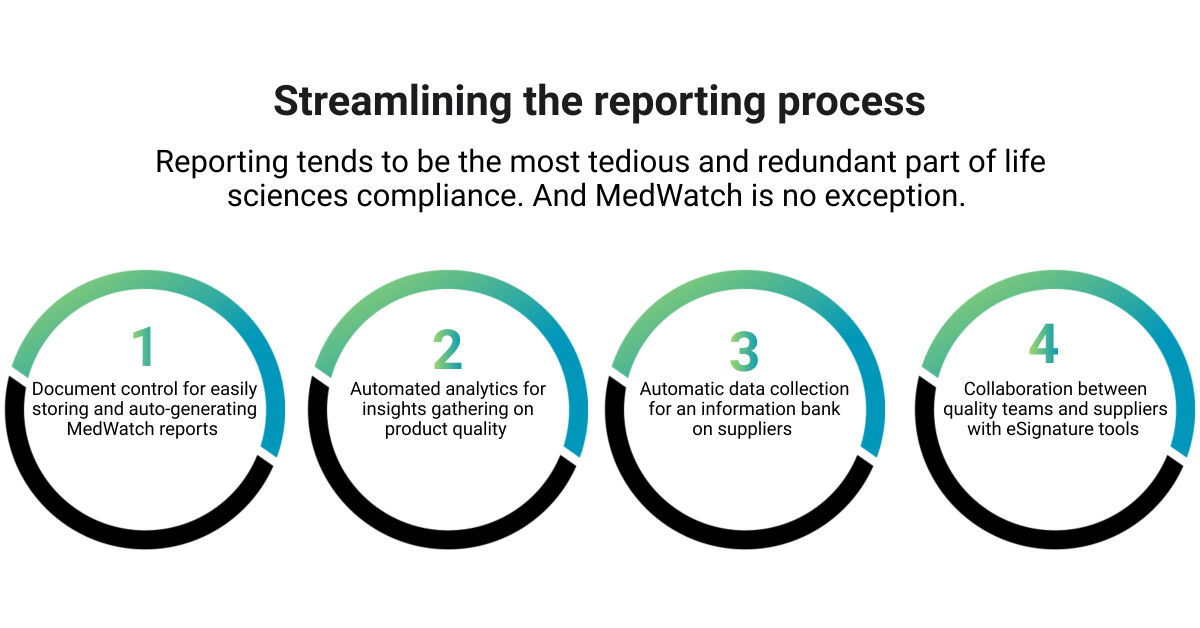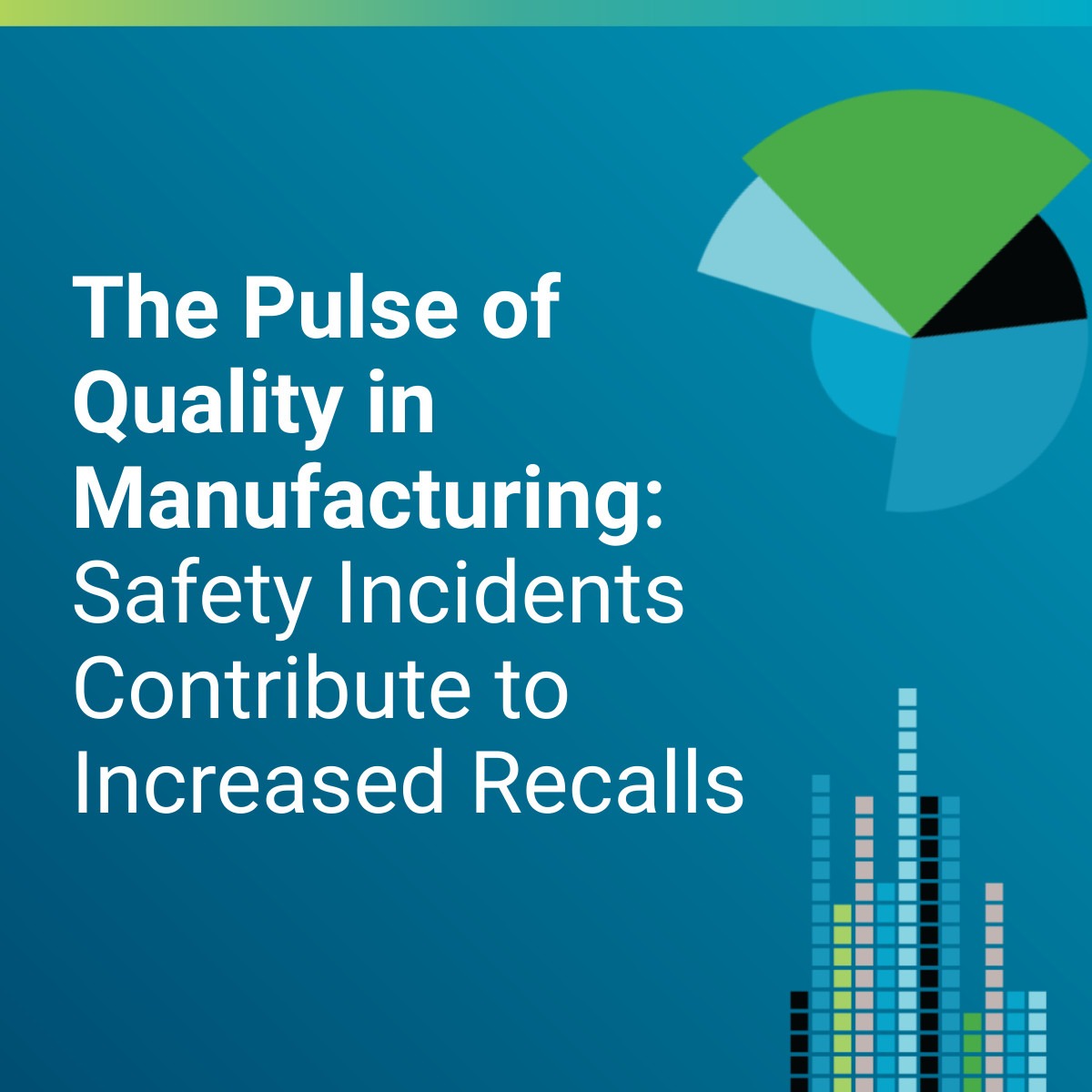Severe financial penalties and legal headaches await medical manufacturers who fail to meet the FDA’s MedWatch reporting requirements. Not to mention the downfall of your brand value. Our guide prepares you with best practices to simplify and streamline MedWatch reporting and achieve compliance at scale.
Preparing for scalable MedWatch reporting
MedWatch reporting is a serious requirement. One that ensures the public remains aware of the safety risks of drugs and medical devices. Therefore, you must start with setting the foundation to maintain FDA compliance — adaptable to the nonstop regulatory changes of MedWatch reporting and scalable as your manufacturing operation grows. What does this look like?
- Equipping your staff with skills to properly report adverse product effects and safety issues per the FDA requirements
- Regularly evaluating compliance updates and changing processes accordingly
- Dedicating a team of specialists and resources exclusively to quality assurance and MedWatch reporting
A central information bank also creates a smoother reporting mechanism. For example, adopting a cloud-based quality management software (QMS) ensures consistency in data and reporting.

You can consolidate all information on products, adverse effects, patient demographics, and other details into one interface for swift AND standardized reporting if you have multiple business units or locations. A QMS also provides system flexibility. As MedWatch requirements evolve, so does your software. Through customization of your modules, data fields, workflows, and integrations, you’ll always be in step with the FDA rules.
Streamlining the reporting process
Reporting tends to be the most tedious and redundant part of life sciences compliance. And MedWatch is no exception. That’s where automation plays a considerable role — and yes, it’s achievable via a QMS.
Products like ETQ Reliance, for example, help you push past the manual redundancies and achieve compliance at scale. Whether you have one drug or dozens, a single production line, or many locations worldwide, you can manage everything in a central, intuitive eQMS platform. One system built for pharmaceutical companies with automation features for:
- Document control for easily storing and auto-generating MedWatch reports
- Automated analytics for insights gathering on product quality, customer complaints, and potential health risks reportable to the FDA
- Automatic data collection for an information bank on suppliers, materials, and drug chemicals that may need to be included in MedWatch reports
- Collaboration between quality teams and suppliers with eSignature tools to automatically sign off on audits and digitally submit MedWatch reports
ETQ Reliance makes it easy to scale operations. You can automatically embed the MedWatch reporting process into your day-to-day workflows without skipping a beat or disrupting production — letting you gather insights to share with the FDA and maintain ongoing compliance, even while adding new locations, bringing on extra team members, or launching new healthcare products.
Overcoming challenges in compliance at scale
As a leading life sciences quality management solutions provider, we know the complexities surrounding MedWatch reporting at scale. The good news is that we know precisely how to fix them:
When you have data silos throughout your growing company that prevent personnel from accessing information needed for MedWatch → Adopt a cloud-based QMS that keeps all your product, quality management, and patient data in one centralized location — accessible to all personnel, regardless of location, role, or product line.
When reporting standards are inconsistent across different teams or locations → Incorporate MedWatch reporting templates and store them in a central data bank, such as an eQMS, so that all teams can report the same way.
When you have MedWatch process bottlenecks and don’t yet have the personnel to meet scaling compliance demands → Leverage automation to put repetitive tasks, like data collection on customer complaints, document generation, or insights gathering for drug safety risks, on autopilot.
When you struggle to maintain MedWatch compliance during rapid growth → As FDA changes occur, update your QMS modules, workflows, and report templates to account for the new information and filing requirements. Also, keep a dedicated team exclusively responsible for overseeing MedWatch and other FDA compliance requirements so nothing slips through the cracks.
REGULATORY COMPLIANCE SOLUTION
ETQ Reliance helps you efficiently meet changing regulatory, compliance, customer and market requirements at scale.
Best practices for ensuring compliance at scale
Technology alone cannot optimize your MedWatch reporting. As your organization scales, ensuring consistent adherence to these regulations requires a multifaceted approach that combines proactive planning, continuous improvement, and a culture of compliance.
Regular compliance audits
Management practices like routine audits (internal or external) are an excellent way to help your business remain compliant and scale effectively with the organization’s needs. How?
- It lets you pinpoint compliance gaps that need to be filled
- Helps spot process bottlenecks that prevent speedy, smooth MedWatch reporting
- It evaluates documentation to see if it meets MedWatch reporting guidelines
These audits ultimately guide you on the right path to scalability by providing recommendations that improve your processes and ensure you’re correctly meeting MedWatch compliance.
Continuous training and development
Consistent employee education is pivotal to keeping up with MedWatch reporting — a complex requirement that always seems to change. Administer a formal training program that includes regular sessions that keep quality teams informed on items like:
- The most up-to-date MedWatch reporting guidelines (when and how to file) and recent regulatory changes
- How to use the QMS or other software features to streamline and collaborate on MedWatch reporting activity
- The most common errors to avoid during MedWatch reporting
Use incentives and rewards to keep employees engaged. While FDA regulations aren’t the most exciting topic, they are vital to ensuring your company’s integrity and financial stability. Solid training keeps everyone in the operation on top of compliance requirements, especially during rapid growth phases and regulatory changes.
Streamline your MedWatch reporting
MedWatch regulations can be a bitter pill to swallow, particularly during rapid expansion or entering new life science markets. Luckily, simplifying and maintaining compliance at scale could soon be a reality. By investing in the right tools (such as a QMS platform) and adopting compliance-friendly strategies, your business can seamlessly create a more efficient MedWatch reporting process — allowing you to avoid hefty FDA penalties and a diminished brand reputation.


